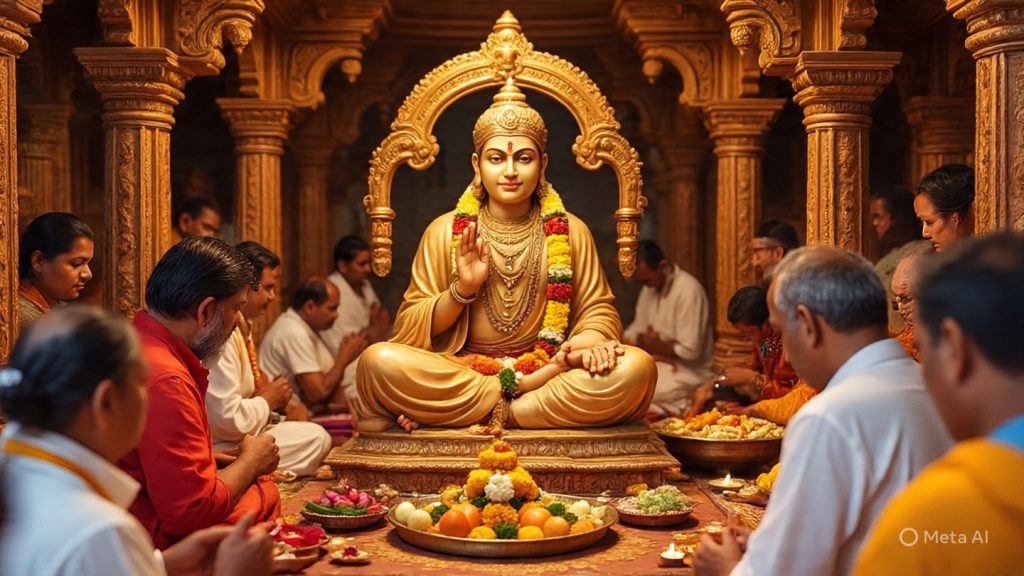Introduction
Festivals are a way to remember the wisdom and sacrifices of great souls who guide humanity. Among the sacred festivals of Jain Dharma, Munisuvrat Jayanti holds a special place. It marks the birth of Lord Munisuvrat Swami, the 20th Tirthankar, who became an eternal symbol of discipline, truth, and Ahimsa (non-violence).
Munisuvrat Jayanti is not just a day of rituals but also a reminder of how one soul’s renunciation and penance illuminated countless lives. In this blog, let us understand the significance of Munisuvrat Jayanti, how it is celebrated, and what lessons we can learn from it in our daily life.
When is Munisuvrat Jayanti Celebrated?
Munisuvrat Jayanti is celebrated on the 8th day of the Shukla Paksha of the month of Jyeshtha (May–June) as per the Jain calendar.
This was the day when Prince Munisuvrat was born in the Harivansh dynasty at Rajgriha (present-day Bihar).
Every year, Jains across the world celebrate this occasion with devotion, joy, and reflection.
Significance of Munisuvrat Jayanti
The importance of Munisuvrat Jayanti lies in remembering:
- Birth of a Great Soul: The arrival of the 20th Tirthankar, whose life became an example of penance and purity.
- Message of Renunciation: His intense tapasya (austerities) symbolizes the power of detachment.
- Spiritual Awakening: Inspires us to live with truth, simplicity, and non-violence.
- Unity in Devotion: The festival brings together Jain communities worldwide in worship and celebration.
Celebrations of Munisuvrat Jayanti
Processions (Rath Yatra)
- Idols of Lord Munisuvrat are placed on beautifully decorated chariots.
- Devotees sing bhajans, chant Navkar Mantra, and recall his teachings.
- The atmosphere is filled with spirituality and joy.
Temple Rituals
- Jain temples are decorated with flowers, lights, and rangoli.
- Abhishek (ceremonial bathing of idols), pujas, and aarti are performed.
- Devotees offer rice, fruits, and flowers with reverence.
Lectures and Discourses
- Jain monks and scholars narrate the inspiring story of Munisuvrat’s penance.
- Teachings of discipline, non-violence, and renunciation are emphasized.
Charity and Seva (Service)
- On this day, devotees engage in acts of kindness.
- Donations to the poor, animal shelters, and hospitals are common.
- Community services like food distribution and medical camps are organized.
Fasting and Meditation
- Many observe fasts as a way to purify the soul.
- Some spend the day in prayer, meditation, or silence.
- Devotion with self-discipline is believed to bring spiritual upliftment.
Munisuvrat Jayanti Across the World
- In India, major celebrations take place at Rajgir (Bihar), associated with Lord Munisuvrat’s life.
- Jain communities in Gujarat, Rajasthan, and Maharashtra celebrate with grandeur.
- Abroad, Jains in the USA, UK, Canada, and Africa organize cultural programs, discourses, and community prayers.
Teachings Remembered on Munisuvrat Jayanti
On this sacred day, devotees reflect on his timeless wisdom:
- Ahimsa (Non-Violence): Do not harm any living being.
- Satya (Truth): Always speak truth with gentleness.
- Aparigraha (Non-Possession): Live simply; avoid greed.
- Tapasya (Penance): Discipline and austerity purify the soul.
- Renunciation: True spiritual life begins with letting go of attachment.
Munisuvrat Jayanti and Its Modern Relevance
The values of Lord Munisuvrat are highly relevant for today’s world:
- For Self-Control: His penance teaches us inner strength and discipline.
- Against Violence: His example reminds us to practice non-violence in thought, word, and deed.
- For Ecology: Respecting life inspires conservation and sustainability.
- For Society: Truthfulness and simplicity bring harmony and peace.
- For Mental Health: Aparigraha (minimalism) reduces stress and greed.
Inspirational Anecdote from Munisuvrat’s Life
Lord Munisuvrat was known for his extraordinary tapasya (penance). He performed severe austerities for long years, showing the world that spiritual victory lies in self-discipline and inner strength.
This powerful story teaches us:
- Spiritual strength comes from renunciation.
- Self-control and patience can conquer all difficulties.
- True greatness lies in purity and penance.
How Can We Celebrate Munisuvrat Jayanti Personally?
- Practice Non-Violence: Avoid harming any being in thought, word, or deed.
- Live Simply: Reduce unnecessary desires and practice Aparigraha.
- Meditate: Spend time in silence and reflection.
- Charity: Share wealth, skills, or time for good causes.
- Discipline: Follow small vows of self-control in daily life.
Conclusion
Munisuvrat Jayanti is not only a religious festival but also a reminder of eternal values—truth, discipline, renunciation, and non-violence. By celebrating it, we honor not only the birth of Lord Munisuvrat but also his timeless teachings that guide humanity toward peace and harmony.
As Lord Munisuvrat’s life shows:
🌿 “True spiritual strength comes from discipline, renunciation, and compassion.” 🌿
Let us celebrate Munisuvrat Jayanti not only with rituals but by practicing love, self-control, and truth in our lives. 🌸

